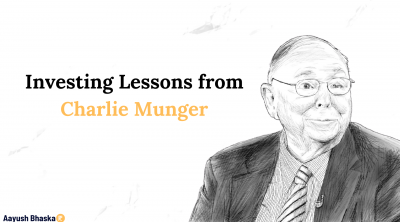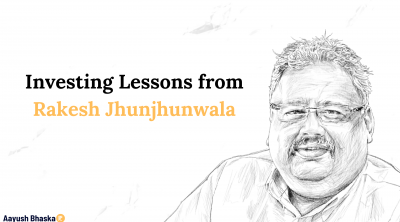With so many attractive credit offers and expensive products on the market, a consumer is impulsively making bad financial decisions.
In such cases, it is nearly impossible to change this habit because of peer pressure and the urge to grab every offer.
However, you can improve this by following the right mindset and you can achieve that with suitable mental models.
Here are some of the most effective mental models that can help you make the right financial decisions.
What Are Mental Models?
In layman’s language, mental models are nothing but a representation of how something works. As the perception of people about the world is different, mental models help in understanding how a person perceives the world in his complex mind.
Furthermore, mental models help us to make better and faster decisions and can be of great help while making financial decisions. Yet, as mental models are unique in themselves, we cannot say they are foolproof or completely failsafe.
They are not always accurate or practical, but can assist in making better decisions with complete information. You can use mental models even when the circumstances get really challenging. They always stay on course and hence can be highly beneficial if used properly.
Just as there are scientific principles for scientific theories, mental models serve as an excellent base for financial decisions. Thus, they play a fundamental role in decision-making.
For example, for an entrepreneur, mental models provide a framework for how to go ahead in the business venture by making sound decisions for the growth of the business.
Similarly, for a trader, making proper financial decisions at the right time could happen only if correct mental models are being put to use.
What Does Right Financial Decisions Mean?
Financial decisions can be very crucial at times and thus, they must be taken very carefully. Whether personal or corporate finance, you need to allocate them efficiently to prevent financial loss or instability.
You need to stay alert and deploy a suitable mental model to make the right financial decisions at the most appropriate time.
Below is the list of 5 highly effective Mental Models that can assist you to make the right financial decisions. Check them out:
1. The Power Of Compounding

Compounding can be simply described as the process of adding up interest on initial interest. This process goes on invariably till the initial amount invested reaches its maturity.
Due to compounding, not just the initial amount invested, but also the interest accrued on the principal generates earnings in the long run. This process goes on continuously, helping you make profits from the principal amount and from every preceding accrued compound interest.
For example,
Principal amount = Rs. 100, ROI = 10% p.a, Period = 10 years
At the end of Year 1 = Accrued interest on the principal is Rs.10 (10% p.a on Rs.100)
So, the amount invested after year one becomes
Principal + Year 1 interest = 100 + 10 = 110
At the end of Year 2 = Accrued interest is Rs.11 [10% p.a on Rs.110 (Rs.100 + Rs.10)
At the end of Year 3 = Accrued interest is Rs.12.1 [10% p.a on Rs.121 (Rs.100 + Rs.10 + Rs.11) And so on…. In this way, the power of compounding helps in the growth of your wealth over time.
2. Opportunity Costs

While making financial decisions, you must focus on hidden costs and not just the direct costs. Opportunity cost is popularly defined as the cost pertaining to the forgone opportunity.
We can even say that whatever we do, there’s an opportunity cost for everything. Opportunity costs come into the picture when there are various alternatives to choose from. In the case of just a single alternative, there is no opportunity cost.
Yet, whenever a person thinks of investing and parking their finances, he or comes across numerous alternatives. In such scenarios, the amount lost by investing in alternative ‘A’ instead of alternative ‘B’ can be called the opportunity cost.
The opportunity cost is a critical mental model that helps to ensure that the optimum use of one’s limited and scarce financial resources is made for your own advantage.
3. Net Present Value
Net present value is nothing but the worth of money today that will mature in the future. Thus, it is a name given to the present value of the money that will mature in the future. It is a fundamental mental model that helps you decide which project you should choose.
Typically, a project with a positive and higher NPV is selected over the one with a lower or negative NPV. NPV refers to all the discounted cash flows added together. Discounting refers to applying an appropriate discounting rate to the cash flows to convert them from future value to present value.
In this way, with a proper calculation based on appropriate discounting rates, NPV can be calculated. It can be of tremendous help in making the right financial decisions at the perfect time.
4. Comparative Advantage
Comparative Advantage refers to something one is good at and proves highly beneficial. One can capitalize on such advantages if it is unique to one.
As per the Law of Comparative Advantage, your decisions should consider the opportunity cost. It should be irrespective of the fact whether absolute Advantage exists or not.
Suppose if there exists an absolute Advantage between two things, the one with the lowest opportunity should be selected and specialized in.
This is a popular economics theory that can help make correct financial decisions for better financial well-being.
5. Regret Minimization
The main aim of this mental model is to minimize future regret by analyzing and interrogating one’s financial decisions through the lens of time. The idea behind this model is how one’s future self would think about the decisions one takes today. It focuses somewhat on the psychological aspect of the human mind to ensure there are no major regrets in the future.
Moreover, this mental model is popularly associated with Jeff Bezos. He used this mental model to quit his typical job and start Amazon when the internet was in the boom. Thanks to this mental model, we now have Amazon as we know it today.
Asking a simple question like whether a decision might give you regret a few years down the line can sometimes help you make the optimal decision for yourself. So think wisely, and choose the decisions which cause you no or less regret in the future.
Summing Up
You can understand mental models as predefined frameworks that would yield a different outcome than what the result would have been if you had taken financial decisions based on their original set of beliefs. They serve as a toolbox for effective decision-making.
You must ensure that appropriate models are deployed to solve a particular problem, just as not every tool is suitable for every issue.
By selecting the appropriate mental model framework, you can easily make the right financial decisions at the right moment, thus ensuring that an opportunity to make a great fortune is appropriately capitalized.








Leave a Reply